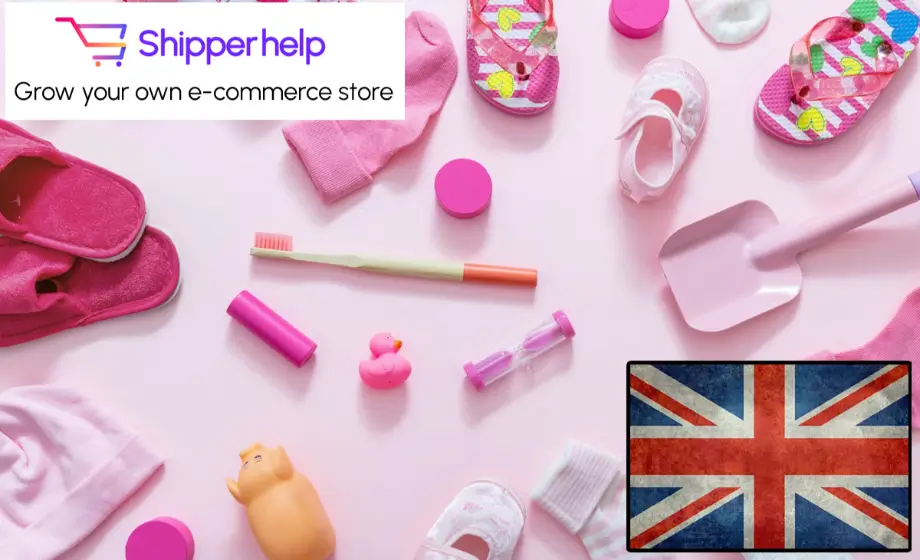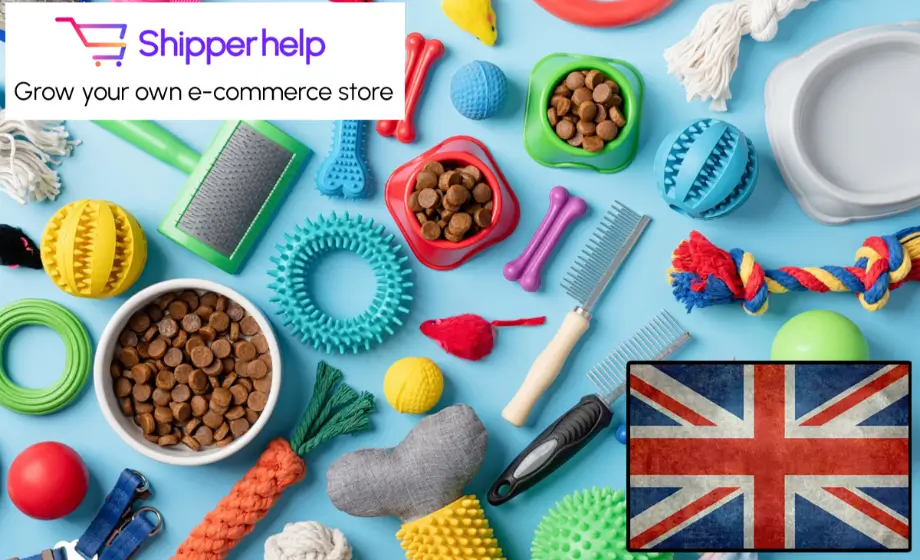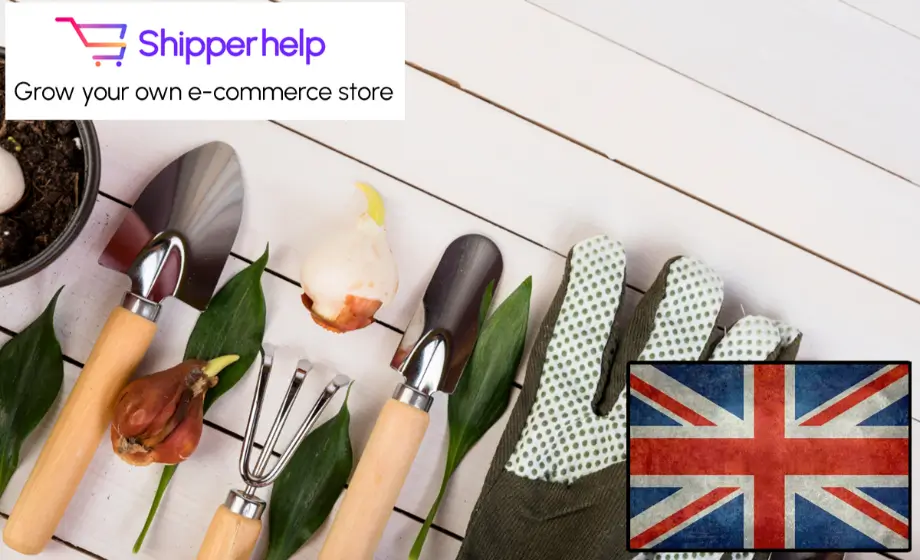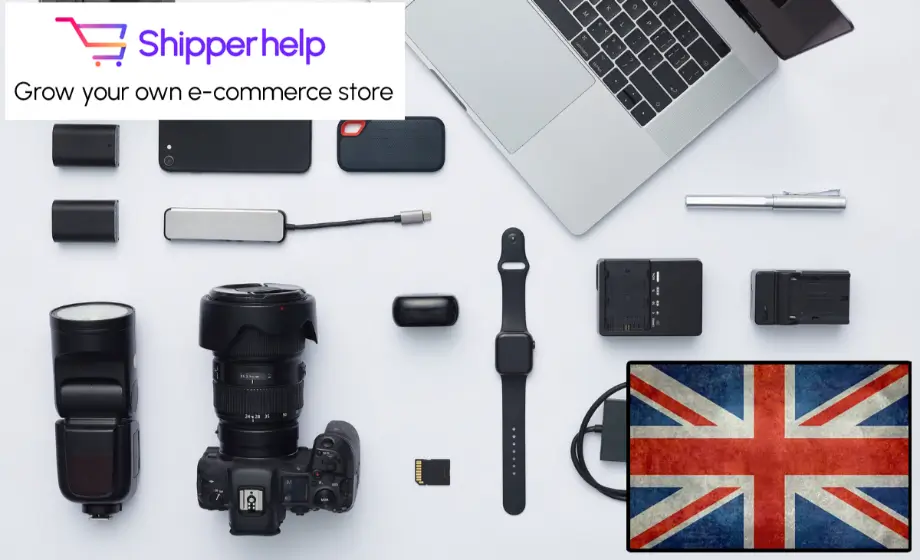
23.51 € El precio original era: 23.51 €.13.71 €El precio actual es: 13.71 €.
★★★★★ 5/5
¡Comience a ayudar a las personas a comprar los productos deseados!










Obtener una lista de proveedores de dropshipping es simple. Después de realizar un pago seguro a través de la banca en línea, recibirá inmediatamente un enlace para descargar la lista en formato pdf.
Aquí puede encontrar los mejores proveedores de productos de Polonia, proveedores de Turquía, proveedores de Alemania, otros países de Europa y de todo el mundo. Encuentra el tuyo y empieza a vender en cualquier nicho.
Todo está perfectamente organizado para que ahorre tiempo y dinero al recibir solo una lista de los proveedores que necesita. No tienes que buscar entre proveedores eróticos si tienes una tienda de juguetes para niños.
Nuestra base de datos cuenta con más de 1000 proveedores que incluyen ropa de hombre y mujer, calzado, productos para niños, electrónica, hogar, jardín, turismo, deportes, productos animales y muchos más.
La lista incluye una gran cantidad de proveedores mayoristas además de proveedores de envío directo. Si tiene suficiente dinero ahorrado, puede comprar productos a granel con descuento y venderlos con un mayor margen de beneficio.
Al ponerse de acuerdo con un proveedor en particular, puede obtener mayores descuentos, ganando así una mayor comisión sobre las ventas, o puede ofrecer a sus clientes comprar a precios competitivos.
The United Kingdom is renowned for its high-quality manufacturing standards, innovative products, and robust supply chain. Sourcing products from the UK offers a plethora of benefits that can significantly enhance the value proposition of your business. Here, we delve into the multifaceted advantages of partnering with UK-based suppliers, underlining how it can be a game-changer for your sourcing strategy.
UK manufacturers are globally recognized for their commitment to quality and excellence. The «Made in Britain» marque is not just a label but a testament to the superior craftsmanship, materials, and production processes adhered to by UK suppliers. This commitment to quality ensures that products sourced from the UK are durable, reliable, and meet high consumer expectations, making it a compelling choice for businesses aiming to elevate their product offerings.
The United Kingdom is at the forefront of innovation, with a strong focus on research and development across various industries. UK suppliers are often pioneers in adopting the latest technologies and innovative practices, from sustainable manufacturing processes to the development of groundbreaking products. By sourcing from the UK, you gain access to products that can set you apart in a competitive market, offering advanced features, better performance, and greater efficiency.
The UK’s robust legal framework offers comprehensive protection for businesses, including clear contracts, intellectual property rights, and dispute resolution mechanisms. This legal environment provides a level of security and peace of mind for companies sourcing products from UK suppliers, ensuring that your investments are safeguarded and that you have recourse in the event of any issues.
UK suppliers are increasingly prioritizing sustainability and ethical practices in their manufacturing processes. This includes a commitment to reducing carbon footprints, ensuring fair labor practices, and utilizing sustainable materials. By choosing UK-based suppliers, businesses can align with these ethical standards, meeting the growing consumer demand for responsible and sustainably sourced products.
The United Kingdom’s strategic location offers excellent logistics and transportation links to Europe and the rest of the world. This geographic advantage facilitates efficient and timely shipping of goods, reducing lead times and enhancing the reliability of supply chains. Whether you’re targeting markets in Europe, North America, or beyond, UK suppliers can provide a logistic advantage that is hard to match.
The common use of English as the primary language of business significantly simplifies communication with UK suppliers. This eliminates potential misunderstandings and streamlines negotiations, product specifications, and quality control processes. Additionally, the UK’s cultural affinity with many Western markets can make product preferences and quality expectations more aligned, ensuring the products sourced meet your market’s needs and tastes.
The UK boasts a diverse economy with strengths in various sectors, from fashion and luxury goods to automotive parts and advanced electronics. This diversity enables businesses to source a wide range of products from UK suppliers, tapping into niche markets and unique product offerings that can differentiate your business in a crowded marketplace.
Partnering with UK suppliers can also enhance your business’s reputation. The association with high-quality, ethically produced, and innovative products can elevate your brand’s status, attracting discerning customers who value quality and sustainability. This can lead to increased customer loyalty, higher sales, and a stronger market position.
Sourcing products from the United Kingdom offers a strategic advantage that goes beyond mere product acquisition. It’s about investing in quality, innovation, ethical production, and sustainability, which can significantly impact your business’s growth and reputation. The myriad benefits of UK suppliers make them an invaluable partner in today’s competitive business landscape, providing the foundation for a successful and sustainable sourcing strategy.
When diving into the realm of procurement and supply chain management within the UK market, one pivotal concern stands at the forefront: ensuring the quality of products sourced from suppliers. The UK boasts a diverse and sophisticated market with suppliers that span various industries, from electronics to textiles. To navigate this landscape successfully and ensure the products you source meet your expectations and standards, a strategic approach is essential.
The first step in securing quality products begins with an exhaustive initial research and vetting process. Engaging with UK suppliers necessitates a thorough examination of their business practices, reputation, and historical performance. Leveraging platforms like ShipperHelp.com provides access to a curated list of reputable suppliers, simplifying this initial step. When vetting suppliers, prioritize those with certifications and standards compliance, such as ISO certifications, which are indicative of their commitment to quality.
Prior to finalizing any agreements, request samples or prototypes of the products. This not only allows you to assess the quality firsthand but also demonstrates the supplier’s confidence in their products. Evaluate these samples against your quality criteria, and consider aspects like material quality, durability, and functionality. For custom products, this step is crucial in ensuring the final product aligns with your specifications.
Quality control is not a one-off task but a continuous process that extends throughout the entire supply chain. Implementing systematic quality control measures with your UK suppliers is fundamental. This includes defining clear quality criteria, establishing regular quality checks, and insisting on transparency in production processes. Communication is key; ensure that you have direct lines of communication with your supplier’s quality control team.
A strong, collaborative relationship with your suppliers can significantly impact product quality. Suppliers who view you as a valued partner are more likely to go above and beyond in meeting your quality standards. Regular visits to the supplier’s facilities, when possible, help strengthen this relationship and provide you with insights into their production processes and quality control measures.
In today’s digital age, leveraging technology is a game-changer in quality assurance. Utilize digital platforms and tools for regular updates, tracking, and quality control documentation. Advanced technologies such as AI and machine learning can predict potential quality issues before they arise, offering an opportunity to address them proactively.
The pursuit of quality is a continuous journey that involves regular evaluation and feedback. Establish feedback loops with your UK suppliers, where constructive feedback is shared, and collaborative efforts are made towards continuous improvement. This not only enhances product quality but also contributes to innovation and efficiency in the production process.
Understanding and navigating the legal and compliance aspects of sourcing from UK suppliers is crucial. This includes adhering to UK standards and regulations, such as safety standards, environmental regulations, and labor laws. Ensure that your suppliers are compliant with these regulations, as non-compliance can affect the quality of products and expose your business to legal risks.
Before the final acceptance of any batch of products, conduct a comprehensive quality assurance and acceptance testing process. This should be aligned with the quality criteria established at the beginning of the supplier relationship. Only accept products that meet or exceed these criteria, and have a clear process in place for addressing any discrepancies.
Ensuring the quality of products when working with UK suppliers requires a strategic, comprehensive approach that covers everything from initial supplier selection to continuous improvement and feedback. By leveraging reputable supplier platforms like ShipperHelp.com, implementing robust quality control measures, and fostering strong relationships with suppliers, businesses can significantly enhance the quality of the products they source. Remember, quality assurance is not just about meeting standards; it’s about exceeding expectations and building a sustainable, successful business.
The United Kingdom is renowned for its diverse range of high-quality products, spanning various industries. UK suppliers are particularly known for their contributions to the fashion, food and beverage, automotive, and technology sectors, among others. This detailed guide will explore the key product types that UK suppliers excel in, shedding light on why these items stand out on the global stage.
UK suppliers in the fashion industry are celebrated for their exceptional craftsmanship, innovative designs, and use of high-quality materials. From luxury fashion brands to bespoke tailoring, the UK has a rich history in fashion that continues to influence trends worldwide. Notably, British wool and textiles are sought after for their durability and comfort, making the UK a pivotal player in the global fashion supply chain.
In the realm of food and beverages, UK suppliers are revered for their exquisite gourmet products, including fine teas, cheeses, and chocolates. The country’s rich agricultural heritage contributes to the production of organic and artisanal foods that cater to a growing demand for sustainable and ethically produced goods. Moreover, the UK’s brewing and distilling industries are globally recognized, with Scotch whisky and craft beers being highly prized for their quality and flavor.
The automotive sector showcases another area where UK suppliers shine. Known for their engineering excellence, UK suppliers contribute to the production of luxury cars, electric vehicles (EVs), and automotive components that meet the highest standards of quality and performance. The UK’s commitment to innovation is evident in its push towards sustainable transportation solutions, making it a key player in the evolving automotive landscape.
UK suppliers are at the forefront of the technology sector, offering cutting-edge products and services that span from software development to advanced manufacturing technologies. The UK’s tech industry is characterized by its focus on innovation, cybersecurity, and artificial intelligence (AI), making it a hub for tech startups and established companies alike. This emphasis on technological advancement positions UK suppliers as leaders in providing solutions that drive digital transformation across industries.
The pharmaceutical and healthcare sector in the UK is another critical area of expertise. UK suppliers and manufacturers are pivotal in the research, development, and production of pharmaceuticals, medical devices, and healthcare technologies. With a strong emphasis on quality and regulatory compliance, the UK plays a vital role in the global healthcare ecosystem, contributing to the advancement of medical science and the improvement of patient care worldwide.
As the world shifts towards sustainability, UK suppliers are making significant strides in the field of renewable energy and environmental technologies. From wind turbines and solar panels to innovative waste management solutions, the UK is committed to developing products that support environmental conservation and energy efficiency. This commitment underscores the UK’s role in combating climate change and promoting a sustainable future for all.
UK suppliers are known for their diverse range of products, characterized by a commitment to quality, innovation, and sustainability. Whether it’s fashion, food and beverages, automotive, technology, healthcare, or renewable energy, the UK continues to set global standards. ShipperHelp.com proudly partners with a wide array of UK suppliers, offering access to premium manufacturers and products. By choosing UK suppliers, businesses can leverage this legacy of excellence to enhance their offerings and compete on a global scale.
ShipperHelp.com remains your trusted partner in connecting with the best of what UK suppliers have to offer. Our meticulously curated supplier and manufacturer lists provide a gateway to the diverse and high-quality products that define the UK’s industrial landscape. Explore our offerings and take the first step towards sourcing superior products that reflect the best of British innovation and craftsmanship.
When engaging with UK-based suppliers, it’s crucial to grasp the unique aspects of shipping that might affect your order’s cost, timeline, and compliance. The United Kingdom, known for its robust trade regulations and extensive network of suppliers across various industries, offers a wealth of opportunities for businesses looking to source high-quality goods. However, navigating the shipping process requires a thoughtful understanding of several key elements to ensure a smooth and efficient transaction.
One of the primary considerations when ordering from UK suppliers is the handling of customs and import taxes. The UK’s departure from the European Union, commonly referred to as Brexit, has introduced changes to the customs procedures and tax implications for goods entering and leaving the UK. It’s essential to be well-informed about the latest regulations to avoid unexpected costs and delays. Familiarizing yourself with the Harmonized System (HS) codes of your products can help you accurately determine the applicable duties and taxes.
Accurate and complete documentation is critical for a seamless shipping process. This includes commercial invoices, packing lists, and, depending on the nature of the goods, specific licenses or certificates. Ensuring that all paperwork accurately reflects the shipped goods can prevent delays at customs and facilitate a quicker clearance process. Additionally, understanding the Incoterms (International Commercial Terms) agreed upon in your contract with the UK supplier can help clarify the responsibilities and costs borne by each party.
Choosing the right shipping method is another vital aspect of ordering from UK suppliers. Depending on your budget, timeframe, and the nature of the goods, you may opt for air freight for faster delivery or sea freight for larger, less time-sensitive shipments. It’s important to discuss transit times with your supplier and select a shipping option that aligns with your inventory needs and customer expectations.
In today’s digital age, visibility into the shipping process is more important than ever. Utilizing tracking technologies and shipment tracking services can provide peace of mind and real-time updates on your shipment’s status. This not only helps in planning and inventory management but also enhances transparency with your customers about delivery timelines.
Proper packaging is essential to protect your goods during transit, especially when shipping internationally. Discuss with your UK supplier the best packaging practices for your specific products, considering factors like weight, dimensions, and fragility. Additionally, understanding any special handling requirements for your goods can prevent damage and ensure that your items arrive in perfect condition.
While efficient planning can mitigate many shipping challenges, it’s also important to be prepared for potential delays and disruptions. Factors such as weather conditions, port congestion, and customs holds can impact transit times. Building flexibility into your supply chain and maintaining open communication with your supplier and shipping provider can help you navigate these uncertainties more effectively.
A successful shipping process starts with a strong partnership with your UK supplier. Open communication, clear expectations, and mutual understanding are the foundations of a reliable supply chain. By fostering good relationships, you can ensure better coordination, receive valuable insights into the UK market, and potentially unlock preferential shipping rates or terms.
The global shipping landscape is continually evolving, influenced by regulatory changes, market dynamics, and technological advancements. Staying informed about these changes and being willing to adapt your shipping strategies accordingly is crucial for long-term success. Engaging with industry forums, attending webinars, and consulting with logistics experts can provide you with the knowledge and insights needed to navigate the complexities of shipping from UK suppliers.
In conclusion, ordering from UK suppliers involves navigating a series of unique shipping considerations, from understanding customs regulations and choosing the right shipping method to ensuring accurate documentation and preparing for potential disruptions. By addressing these key areas with thorough preparation and strategic planning, you can build a resilient and efficient supply chain that leverages the best of what UK suppliers have to offer.
Brexit, the United Kingdom’s departure from the European Union, has significantly transformed the trade landscape, affecting businesses and sourcing strategies worldwide. This change presents a new set of challenges and opportunities for companies looking to source products from UK suppliers. Understanding these shifts is crucial for making informed decisions and maintaining a competitive edge in the global market.
One of the most immediate effects of Brexit on sourcing from the UK is the introduction of customs declarations and potentially tariffs on goods moving between the UK and EU countries. This means that goods sourced from the UK may now incur additional costs and require more paperwork, affecting their overall cost-effectiveness. It’s essential for businesses to stay updated on the latest trade agreements and tariff schedules to accurately calculate these new costs.
To navigate the increased costs due to tariffs and customs, companies can explore several strategies. These include diversifying supply chains to include suppliers from both within and outside the UK, negotiating better terms with current suppliers, and leveraging technology to streamline customs processes. Additionally, taking advantage of any trade agreements that offer tariff reductions or exemptions can significantly mitigate these costs.
Brexit has also led to changes in border controls and regulations, resulting in potential delays and disruptions in the supply chain. These changes can affect the reliability of delivery times, inventory levels, and ultimately, the ability to meet customer demands promptly.
To minimize the impact of supply chain disruptions, businesses can adopt a more flexible approach to inventory management and logistics. This might include increasing safety stock levels, establishing alternative logistics routes, or partnering with logistics providers that offer innovative solutions for navigating post-Brexit challenges. Building strong relationships with suppliers and having open lines of communication can also help in quickly addressing and resolving any issues that arise.
Brexit has resulted in the UK establishing its own regulatory framework separate from the EU. This means that products sourced from the UK may need to meet different standards and certifications to be sold in the EU and vice versa.
Staying compliant in this evolving regulatory landscape requires diligent monitoring of both UK and EU regulations. Businesses should consider working with compliance experts or legal advisors to ensure that their products meet all necessary requirements. Additionally, developing a compliance checklist and regularly auditing the supply chain can help prevent any regulatory missteps.
Despite the challenges, Brexit also presents opportunities for strategic sourcing from the UK. The changing trade dynamics may lead to competitive advantages for companies that adapt quickly and effectively to the new environment.
Businesses can explore new sourcing opportunities that arise from the UK’s trade agreements with non-EU countries. Additionally, the shift in currency value post-Brexit might make UK goods more competitively priced on the global market. Companies should continuously assess the sourcing landscape, looking for opportunities to diversify their supplier base and negotiate favorable terms.
The post-Brexit era underscores the importance of digital technology in managing supply chains efficiently. Digital platforms can facilitate smoother customs processes, better communication with suppliers, and real-time tracking of shipments.
Investing in supply chain management software, blockchain technology for transparent tracking, and AI-driven analytics for market insights can empower businesses to navigate the complexities of sourcing from the UK post-Brexit. These technologies not only improve operational efficiency but also provide strategic insights for making informed sourcing decisions.
Brexit has undeniably altered the landscape for sourcing from UK suppliers, introducing both challenges and opportunities. By understanding and adapting to these changes, businesses can navigate the new trade realities effectively. Embracing strategies that mitigate increased costs, ensure supply chain resilience, comply with regulatory changes, and leverage digital transformation will be key to thriving in the post-Brexit era. ShipperHelp.com is dedicated to providing up-to-date information and resources to help businesses adapt their sourcing strategies and continue to thrive in this changing landscape.
In today’s market, the demand for eco-friendly and sustainable products is not just a trend but a shift towards more responsible consumerism. Businesses looking to align with these values often face challenges in sourcing suppliers that meet their sustainability criteria. ShipperHelp.com emerges as a critical resource for such businesses, providing a comprehensive database of verified eco-friendly and sustainable suppliers in the UK. This guide will explore how ShipperHelp.com can facilitate your journey toward greener business practices.
Eco-friendly sourcing emphasizes procuring goods and services that are produced in ways that do not harm the environment. This encompasses a wide range of practices, from using renewable resources to minimizing carbon footprint during production. Sustainable sourcing extends this concept by ensuring that sourcing practices meet current needs without compromising the ability of future generations to meet theirs.
ShipperHelp.com takes the guesswork out of finding reliable eco-friendly suppliers. Our lists are meticulously curated, featuring suppliers who are not only committed to sustainable practices but also hold certifications and accolades in their respective fields. This vetting process ensures that you connect with partners who share your dedication to environmental stewardship.
Our platform is designed with user-friendly search features that allow you to filter suppliers based on specific eco-friendly credentials. Whether you’re looking for zero-waste packaging solutions, renewable energy-powered manufacturing, or organic material sourcing, ShipperHelp.com makes it easy to find suppliers that meet your criteria.
Adopting eco-friendly and sustainable sourcing practices offers numerous benefits. It enhances your brand’s reputation, meets consumer demand for responsible products, and often results in long-term cost savings through efficient resource use. Furthermore, it reduces your carbon footprint, contributing positively to environmental conservation efforts.
Before you embark on sourcing eco-friendly suppliers, conduct a sustainability audit of your current operations. This will help you identify areas for improvement and set realistic goals for integrating sustainable practices into your business.
Ensure that your team understands the importance of sustainability and how it aligns with your business objectives. Training and ongoing education can foster a culture of environmental responsibility within your organization.
While the benefits of eco-friendly sourcing are clear, businesses may encounter challenges such as higher upfront costs, limited supplier options, and navigating certifications. ShipperHelp.com addresses these challenges by offering a diverse range of suppliers to fit various budgets and by providing clear information on certifications and standards.
Explore case studies and success stories of businesses that have successfully transitioned to eco-friendly sourcing with the help of ShipperHelp.com. These narratives provide practical insights and inspire confidence in the feasibility and benefits of making such a shift.
Getting started with ShipperHelp.com is straightforward. Sign up for an account, specify your sourcing needs, and gain instant access to our extensive list of eco-friendly suppliers in the UK.
Embracing eco-friendly and sustainable suppliers is not only beneficial for the environment but also for your business’s bottom line and brand image. ShipperHelp.com stands as your partner in this journey, offering the resources, support, and network you need to make a positive impact. Start your path to sustainability with us and contribute to a greener, more sustainable future.
Minimum Order Quantities, or MOQs, are the smallest amount of stock that a supplier is willing to sell. It’s a crucial factor for retailers, especially those starting new ventures or looking to introduce new products. MOQs can significantly affect your inventory costs and cash flow. Understanding MOQs is essential when planning your procurement strategy, particularly when dealing with suppliers from the UK.
MOQs directly impact your inventory levels, budget allocation, and pricing strategy. They are a key consideration in managing supply chain efficiency and negotiating with suppliers. By comprehensively understanding MOQs, businesses can make informed decisions, optimize their purchasing power, and enhance profitability.
Negotiating MOQs requires a strategic approach. Start by researching and understanding the supplier’s position. Suppliers set MOQs for various reasons, including production costs, inventory management, and market demand. Presenting a clear business case, showcasing your market knowledge, and demonstrating the potential for a long-term relationship can help in negotiating more favorable MOQs. Consider proposing a trial order, which, if successful, could lead to larger purchases.
Building a strong relationship with your UK supplier is pivotal. Suppliers are more likely to offer flexible MOQs to buyers they trust and see potential in. Regular communication, prompt payments, and a collaborative approach can strengthen this relationship. Over time, as your business grows, suppliers may also be more open to renegotiating MOQs to accommodate your scaling needs.
Market trends play a significant role in determining MOQs. For instance, if a product is in high demand, suppliers might be willing to lower MOQs to accommodate more buyers. Conversely, for niche or specialized items, MOQs might be higher due to limited production runs. Staying informed about market trends and leveraging this knowledge can be beneficial in discussions about MOQs.
Allocating your budget with MOQs in mind is essential for financial health. It involves balancing the cost of inventory with potential sales revenue and storage costs. Businesses should conduct thorough market research to predict sales volume accurately and plan purchases accordingly. This planning ensures that you are not over-investing in inventory while still meeting supplier MOQs.
Effective inventory management is key to handling MOQ challenges. Techniques such as just-in-time (JIT) inventory can help minimize storage costs and reduce the risk of overstocking. Additionally, consider collaborating with other businesses to meet MOQs and share inventory. This approach, known as group buying or collective purchasing, can offer a practical solution for small businesses.
Technological solutions like inventory management software and supply chain management platforms can offer significant advantages. These tools provide real-time data on stock levels, track orders, and analyze sales trends, helping businesses make informed purchasing decisions. They can also streamline communication with suppliers, making it easier to negotiate and manage MOQs effectively.
MOQs are a critical element in the supplier-buyer relationship, especially for businesses working with UK suppliers. Understanding, negotiating, and managing MOQs are key skills that can lead to more favorable terms and contribute to your business’s success. By applying the strategies discussed, businesses can navigate the challenges of MOQs, foster strong supplier relationships, and optimize their inventory management for better financial outcomes.
When importing goods from the UK, understanding the customs regulations of your country is paramount. Customs regulations are designed to control the flow of goods into a country, including prohibitions and restrictions on certain imports. Familiarize yourself with these regulations to ensure your imports comply. This can involve researching your country’s customs website, consulting with trade experts, or leveraging resources provided by suppliers on ShipperHelp.com.
Import taxes and duties are charges imposed by a country on goods brought across its borders. In many cases, the amount of import tax and duty is determined by the value of the goods, their type, and their origin. Knowing how these taxes are calculated will help you budget accurately and avoid unexpected costs. ShipperHelp.com provides access to suppliers who can offer guidance on the typical duties and taxes for their products.
Many countries have trade agreements with the UK that may reduce or eliminate import taxes on certain goods. Investigating these agreements can provide significant savings. For example, if your country has a Free Trade Agreement (FTA) with the UK, certain goods may be eligible for reduced tariffs or duty-free importation. ShipperHelp.com’s suppliers are often knowledgeable about these agreements and can advise on how to take advantage of them.
The classification of goods is crucial for determining the correct import duties and taxes. Goods are classified using a system known as the Harmonized System (HS) code. Misclassification can lead to incorrect duty payments and potential penalties. Suppliers on ShipperHelp.com typically provide the HS codes for their products, which can help you classify your goods accurately and forecast the costs involved.
Proper documentation is essential for a smooth customs process. This typically includes the commercial invoice, packing list, bill of lading, and any required certificates or licenses. The commercial invoice should accurately describe the goods, their value, and the terms of sale. Suppliers from ShipperHelp.com can assist in preparing these documents to ensure they meet the requirements of both the UK and your local customs authority.
The Value Added Tax (VAT) is a tax that may apply to goods imported from the UK, depending on your country’s tax system. Understanding how VAT affects your imports is important for budgeting and compliance. In some cases, businesses may be eligible to reclaim the VAT paid on imported goods. Information from ShipperHelp.com suppliers can help clarify the VAT implications for their specific products.
A customs broker is a professional who specializes in navigating the complexities of customs regulations and procedures. They can manage the import process on your behalf, ensuring that your goods are cleared through customs efficiently and without delays. Engaging with a customs broker can be particularly beneficial if you are dealing with high-value shipments or a wide variety of goods. ShipperHelp.com suppliers may recommend trusted brokers who have experience with their products.
Customs regulations and tax rates are subject to change, and staying informed about these changes is crucial. Regularly check official government resources, subscribe to trade newsletters, and maintain communication with your suppliers on ShipperHelp.com. They can provide updates on any regulatory changes that might affect your imports.
Customs inspections are a standard part of the import process and can lead to delays. Planning for these potential delays is important for maintaining your supply chain’s efficiency. This includes budgeting extra time for your shipments to clear customs and keeping your customers informed about possible delays. ShipperHelp.com suppliers understand the inspection process and can offer advice on minimizing the impact on your deliveries.
Navigating customs and import taxes for goods sourced from the UK involves understanding and complying with regulations, leveraging trade agreements, correctly classifying your goods, preparing the necessary documentation, and engaging with professionals like customs brokers. By following these strategies, businesses can maximize efficiency, comply with regulations, and minimize costs. ShipperHelp.com provides access to suppliers who can offer valuable guidance throughout this process, ensuring that your importing experience is as smooth and cost-effective as possible.
Navigating the complex world of supply chain management, particularly when dealing with UK suppliers, can be a daunting task for businesses of all sizes. One common query that arises is the feasibility of obtaining samples before committing to a bulk order. This question underscores the importance of ensuring product quality and compatibility with your business needs before making significant investments.
Requesting samples is a critical step in the procurement process. It allows businesses to physically assess the quality, functionality, and compatibility of products. Samples serve as a tangible benchmark for quality assurance, enabling businesses to make informed decisions and reduce the risk of future complications with inventory or customer satisfaction.
Initiating communication with UK suppliers is the first step toward securing samples. ShipperHelp.com provides an extensive list of reliable suppliers, making it easier for businesses to connect with the right partners. When reaching out, be clear and concise about your requirements. Specify the product(s) you’re interested in, the purpose of requesting samples, and how it fits into your larger business strategy.
Securing samples can sometimes be challenging, but with the right approach, you can streamline the process and ensure a positive outcome.
Before contacting a supplier, define what you aim to achieve with the samples. Whether it’s to test the quality, evaluate the design, or verify the product’s specifications, having a clear objective will guide your discussions with suppliers and help them understand your needs better.
Suppliers are more likely to respond favourably to requests that come with a well-thought-out business proposal. Outline your business, your market potential, and how the supplier’s products fit into your business model. Demonstrating your seriousness and potential for future orders can make suppliers more inclined to provide samples.
It’s common for suppliers to charge for samples, especially if the products are high in value or require customization. These costs may cover the product itself, shipping, and any additional handling fees. However, many suppliers are willing to negotiate sample costs, especially if there’s a strong potential for bulk orders.
Negotiation is key to obtaining favourable terms for samples. Consider discussing the possibility of refundable sample costs upon placing a bulk order. Alternatively, negotiate lower prices or free samples in exchange for covering shipping costs. Clear communication and a demonstration of commitment can often lead to more favourable terms.
ShipperHelp.com offers curated lists of suppliers and manufacturers, streamlining the process of finding and contacting potential partners in the UK. Utilize these lists to identify suppliers that align with your business needs.
Securing samples is a crucial step in establishing a successful business relationship with a UK supplier. While it may require persistence and sometimes negotiation, the effort is well worth it. Samples allow you to ensure the product meets your standards and expectations before making a larger commitment.
Leveraging ShipperHelp.com for your supplier search and sample acquisition efforts can significantly streamline the process. With a comprehensive list of vetted suppliers, ShipperHelp.com is an invaluable resource for businesses looking to source products from the UK confidently.
In conclusion, obtaining samples from UK suppliers is not only possible but highly recommended before placing a bulk order. This practice ensures that the products meet your quality standards and are a good fit for your business model. By following the strategies outlined above, businesses can navigate the sample acquisition process more effectively and establish fruitful relationships with suppliers.
In today’s global marketplace, effective communication stands as a critical factor in forging successful business relationships. When it comes to partnering with UK suppliers, understanding the nuances of language and communication is paramount. While the UK is predominantly English-speaking, it’s essential to recognize the cultural and linguistic subtleties that can influence business dealings.
One might assume that language barriers are non-existent when dealing with UK suppliers due to the common use of English. However, regional dialects, industry-specific jargon, and cultural nuances can sometimes complicate communication. Ensuring clarity and uniformity in language use can significantly mitigate these challenges. Utilizing simple, clear, and concise language while avoiding colloquialisms can aid in preventing misunderstandings.
The realm of supplier and manufacturer dealings is often riddled with technical language and industry-specific jargon. Familiarizing oneself with these terms and clarifying any ambiguities at the outset can streamline communication and facilitate smoother transactions. ShipperHelp.com provides access to comprehensive suppliers/manufacturers lists, including insights into industry terminologies and practices, helping bridge the language gap.
Understanding and respecting cultural nuances can significantly enhance communication with UK suppliers. The UK business culture values politeness, punctuality, and formality to varying degrees, depending on the context. Acknowledging these cultural aspects in your communication can foster a respectful and productive business relationship.
The advent of technology has dramatically transformed how businesses communicate. Leveraging communication tools such as video conferencing, instant messaging, and collaborative platforms can help overcome potential language barriers. These technologies not only facilitate real-time communication but also provide platforms for sharing documents and other resources that can aid in clarity.
Developing a relationship-based approach to business dealings with UK suppliers can be a game-changer. Establishing a rapport and maintaining regular, open lines of communication contribute to building trust. This approach not only helps in resolving any language or communication issues more effectively but also in creating long-term partnerships.
The landscape of global trade and communication is ever-evolving. Engaging in continuous learning and improvement in language skills, cultural understanding, and industry knowledge can significantly enhance your ability to communicate effectively with UK suppliers. ShipperHelp.com offers resources to navigate these aspects, ensuring that you are always equipped with the latest and most relevant information.
Effective communication with UK suppliers, while seemingly straightforward due to the common language, requires attention to detail and an understanding of cultural and linguistic subtleties. By focusing on clarity, leveraging technology, embracing cultural nuances, and fostering relationships, businesses can overcome potential communication barriers. ShipperHelp.com stands as a valuable resource, offering access to a wealth of supplier and manufacturer lists and insights that empower businesses to navigate these challenges successfully.
In conclusion, while language and communication barriers may pose challenges, they are by no means insurmountable. With the right strategies, tools, and resources, businesses can foster effective and fruitful relationships with UK suppliers.
Dropshipping has become a popular business model for entrepreneurs around the globe, allowing them to sell products directly to consumers without holding any inventory. When it comes to leveraging UK suppliers for dropshipping, there are several key points to consider to ensure a successful partnership and operation.
UK suppliers are increasingly supporting dropshipping for international retailers, recognizing the global market’s vast potential. This approach opens up a world of opportunities for retailers to access a wide range of products, from fashion to electronics, without the need for a physical inventory. UK suppliers are known for their high-quality products, reliable shipping, and adherence to ethical manufacturing practices, making them attractive partners for dropshipping businesses.
One of the primary benefits of working with UK suppliers is the quality assurance that comes with their products. The UK has strict standards for manufacturing and quality control, ensuring that products meet high standards. Additionally, UK suppliers often have shorter shipping times to European countries, which can be a significant advantage for dropshipping retailers targeting European markets.
Moreover, UK suppliers are generally well-versed in international shipping practices, including customs regulations and duties, which can streamline the logistics process for dropshipping businesses. This expertise can reduce the likelihood of shipping delays and improve the overall customer experience.
To maximize the benefits of dropshipping with UK suppliers, retailers should adopt strategic approaches that foster strong partnerships and efficient operations.
Clear and consistent communication is crucial when working with any supplier, especially for international dropshipping. Retailers should ensure they have agreed upon terms regarding order processing times, shipping methods, and handling of returns or damaged goods. Regular check-ins can help maintain a good relationship and quickly address any issues that arise.
Utilizing dropshipping software and tools that integrate with UK suppliers’ systems can significantly enhance operational efficiency. These tools can automate order processing, tracking, and inventory management, reducing the manual workload for retailers and minimizing the risk of errors.
International retailers must be aware of the legal and regulatory requirements for selling in their target markets, including tax obligations and compliance with local laws. This understanding can prevent potential legal issues and ensure smooth operations.
Targeting specific niches can be a highly effective strategy for dropshipping retailers. UK suppliers may offer unique products that cater to particular interests or needs, allowing retailers to stand out in the market. By focusing on niche markets, retailers can build a loyal customer base and achieve higher margins.
While there are many advantages to working with UK suppliers for dropshipping, retailers may face challenges such as higher product costs due to the quality of goods and potentially longer shipping times to destinations outside Europe. To mitigate these challenges, retailers can:
Dropshipping with UK suppliers offers international retailers a promising opportunity to expand their product offerings and reach new markets. By understanding the benefits and challenges, implementing effective strategies, and maintaining strong partnerships with suppliers, retailers can build successful dropshipping businesses that capitalize on the strengths of UK suppliers. As the ecommerce landscape continues to evolve, the agility and global perspective provided by dropshipping will remain invaluable assets for retailers looking to grow and thrive.
In recent years, suppliers from the United Kingdom have increasingly embraced sustainability and environmentally friendly practices. This shift is driven by a growing consumer demand for products that are produced in an ethical and eco-conscious manner. UK suppliers are incorporating sustainable materials, reducing waste, and optimizing their production processes to minimize their carbon footprint. This trend not only helps in conserving the environment but also enhances the brand image of suppliers, making them more attractive to businesses that prioritize sustainability in their supply chain.
The adoption of advanced technology is another significant trend among UK suppliers. With the integration of automation, artificial intelligence, and blockchain, suppliers are enhancing their operational efficiency, ensuring product quality, and improving traceability. These technological advancements enable suppliers to meet the demands of a rapidly changing market, providing them with a competitive edge. Particularly, blockchain technology is gaining traction for its ability to offer transparent and secure supply chain management solutions, fostering trust among businesses.
Amid global supply chain disruptions, there has been a noticeable shift towards local sourcing among UK suppliers. This trend is partly driven by the desire to reduce dependency on overseas suppliers and mitigate risks associated with transportation delays and tariffs. By sourcing materials locally, UK suppliers can offer shorter lead times, more flexible production capabilities, and lower transportation costs. This not only supports the local economy but also appeals to businesses looking to enhance their supply chain resilience.
UK suppliers are increasingly offering customization and personalization options to meet the specific needs of businesses. This trend is facilitated by advancements in manufacturing technologies, such as 3D printing, which allow for cost-effective production of customized products in small batches. Suppliers are recognizing the value of catering to niche markets and the importance of differentiation in a competitive landscape. This approach enables businesses to offer unique products and tailor their offerings to specific customer preferences.
Ethical sourcing and transparency have become key considerations for businesses in selecting suppliers. UK suppliers are responding to this demand by ensuring their supply chains are ethical and transparent. This involves rigorous supplier audits, compliance with labor standards, and transparent communication about sourcing practices. Suppliers that demonstrate a commitment to ethical practices are increasingly preferred by businesses, as consumers become more conscious of the social impact of their purchasing decisions.
The rise of e-commerce has led UK suppliers to adapt their strategies to cater to online businesses. This includes optimizing their logistics and distribution channels to support fast and reliable shipping, which is crucial for e-commerce success. Suppliers are also leveraging online platforms for direct communication with businesses, offering digital catalogs, and facilitating online ordering processes. This trend highlights the importance of digital presence and agility in meeting the demands of the modern marketplace.
Collaboration and partnerships are becoming increasingly important for UK suppliers. By working closely with businesses, suppliers can better understand their needs and challenges, leading to more tailored and effective solutions. Collaborative partnerships can also facilitate innovation, as suppliers and businesses combine their expertise to develop new products and improve supply chain efficiency. This trend emphasizes the value of strong relationships and strategic alliances in achieving mutual success.
The landscape of UK suppliers is characterized by several key trends, including a strong emphasis on sustainability, technological advancements, local sourcing, customization, personalization, ethical sourcing, adaptation to e-commerce, and a focus on collaboration and partnerships. These trends reflect the evolving expectations of businesses and consumers, driving suppliers to adapt and innovate. For businesses looking to source from the UK, understanding these trends is crucial in selecting suppliers that align with their values and operational needs. ShipperHelp.com is dedicated to providing up-to-date and comprehensive lists of UK suppliers that are at the forefront of these trends, ensuring businesses can connect with reliable, innovative, and ethical suppliers that can help them achieve their strategic objectives.
When considering bulk orders with UK suppliers, it’s crucial to approach the negotiation table with a solid understanding of the market dynamics and pricing strategies. UK suppliers, much like those in other regions, operate within a competitive landscape where pricing can often be flexible, especially when it comes to larger orders. The possibility of negotiating pricing hinges on several factors, including order volume, long-term partnership potential, and the specific industry standards.
Bulk orders naturally lend themselves to negotiation opportunities. When you approach a supplier with the prospect of a large order, you’re not just offering immediate business; you’re hinting at the potential for steady, ongoing demand. This is appealing to suppliers for several reasons, including inventory management, production planning, and cash flow forecasting. In essence, bulk orders can create a win-win situation where suppliers are willing to offer more favorable terms in exchange for the guaranteed business and simplified logistics.
Before diving into negotiations, it’s important to establish a rapport with your UK supplier. A solid relationship based on trust and mutual benefit lays the groundwork for more effective communication and negotiation. Suppliers are more likely to offer better prices to businesses they view as long-term partners rather than one-time buyers. This involves regular communication, fair dealings, and a genuine interest in creating a partnership that benefits both parties.
Negotiating prices with UK suppliers requires a strategic approach. Here are some effective strategies to employ:
Research Market Prices: Before initiating negotiations, arm yourself with information about the standard market prices for the products you intend to purchase. This knowledge will give you a solid foundation for discussions and help you understand what constitutes a reasonable offer.
Volume Commitments: Be clear about the volumes you are proposing to order. Larger volumes often justify lower prices due to the economies of scale. If possible, discuss future orders or contracts to pique the supplier’s interest in offering a discount.
Highlight Long-term Potential: Suppliers are more inclined to offer better rates if they see the potential for a long-term business relationship. Discuss your future needs and how the supplier could play a critical role in fulfilling those needs.
Ask for Trade References: Providing trade references can assure the supplier of your business’s credibility and financial stability, making them more comfortable with offering better prices.
Be Open to Counteroffers: Negotiation is a two-way street. Be open to counteroffers from the supplier, as there might be alternatives that offer mutual benefits, such as longer payment terms or bulk shipping discounts.
Consider Non-price Factors: Sometimes, the best negotiation outcomes aren’t just about the price. Consider negotiating for better payment terms, faster shipping, or higher quality products as part of the overall deal.
It’s important to note that negotiation tactics can vary significantly depending on the industry. For example, in industries with tight margins or standardized products, there might be less room for negotiation on price but more on delivery times or minimum order quantities. Conversely, industries with custom-made or highly specialized products may offer more price flexibility. Understanding the specifics of your industry can guide your negotiation strategy effectively.
ShipperHelp.com offers an extensive list of verified UK suppliers across various industries, providing a solid starting point for your bulk order negotiations. Utilizing this resource can save time and ensure you are dealing with reputable suppliers. Additionally, the platform offers insights and tips on negotiation strategies specific to different industries, helping you approach negotiations with confidence.
Negotiating with UK suppliers for bulk orders is not just about haggling over prices; it’s about building relationships, understanding market dynamics, and leveraging the right strategies to achieve a deal that benefits both parties. With thorough preparation, a clear understanding of your needs and market standards, and a focus on long-term partnerships, you can navigate the negotiation process to secure favorable terms and build a sustainable supply chain for your business.
Remember, negotiation is an art that involves patience, strategy, and communication. By approaching it with the right mindset and preparation, you can create valuable partnerships with UK suppliers that support your business’s growth and success. ShipperHelp.com is your partner in this journey, providing the tools and information you need to make informed decisions and negotiate effectively.
Find out what other people think
As a boutique owner, I'm always looking for high-quality, unique beauty products. The German suppliers list from Shipperhelp introduced me to some fantastic brands I now proudly stock. My customers are thrilled, and so am I. Un grand merci à Shipperhelp!.
Purchased: Perfume and beauty products suppliers information from Germany
Absolutely thrilled with the Dropshipping list from Poland I got from Shipperhelp! It was my first foray into e-commerce, and this list made it so easy to start. Found some incredible suppliers with unique products that really stand out. My store's getting great traffic thanks to this. Highly recommend.
Purchased: Various suppliers information (Dropshipping) from Poland
Finding reliable electronics suppliers can be daunting. Shipperhelp's list was a game-changer for me. High-quality suppliers with a wide range of products at competitive prices. My tech store's inventory has never looked better
Was skeptical at first about buying a suppliers list online, but Shipperhelp's furniture list from Poland was a pleasant surprise. Found exactly what my store needed - quality furniture at good prices. Easy process, great results.
Purchased: Furniture suppliers information from Poland
Expanding my gift shop's inventory with unique items was easy with Shipperhelp's Polish suppliers list. Exceptional variety and creativity in products. My sales have gone up. Serdecznie dziękuję, Shipperhelp!
Purchased: Gifts and souvenirs suppliers information from Poland
Finding top-notch organic suppliers was crucial for my health-focused e-commerce. The Polish suppliers list from Shipperhelp was a goldmine of quality and reliability. My customers are delighted with the variety and quality. Shipperhelp is an invaluable resource
Purchased: Organic food and supplement suppliers information from Poland
Finding safe and educational toys for my online store was a priority. The Polish suppliers list from Shipperhelp offered just that. Quality toys that parents trust and kids love. Suur tänu, Shipperhelp, for making this possible
Purchased: Kids toys suppliers information from Poland
Expanding my pet store with unique and quality products was made easy with the Turkish suppliers list from Shipperhelp. Our furry friends and their owners are thrilled. Shipperhelp is fantastic selection
Introducing luxury German beauty products into my boutique significantly uplifted my brand. Shipperhelp's suppliers list was key to sourcing these high-quality items. My customers love the new range. Didelis ačiū
Purchased: Perfume and beauty products suppliers information from Germany
Simplemente complete el formulario de consulta y uno de nuestros especialistas se comunicará con usted con una oferta personalizada y respuestas a todas sus preguntas. ¡Obtenga una tienda en línea profesional con todas las integraciones necesarias! También proporcionamos servicios de importación/exportación de productos desde XML u otros archivos, traducción de productos y mantenimiento de tiendas.
Ingrese su correo electrónico a continuación para recibir noticias sobre las últimas listas de envío e información interesante.